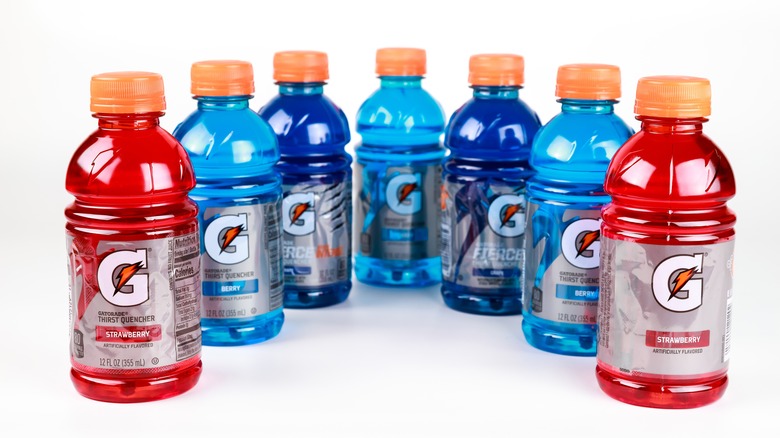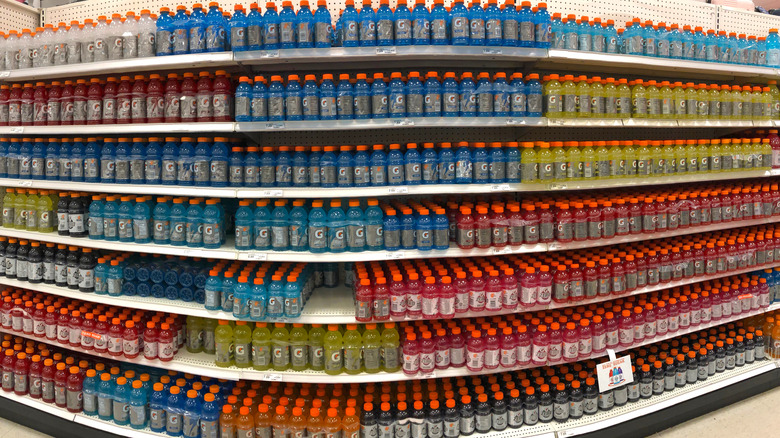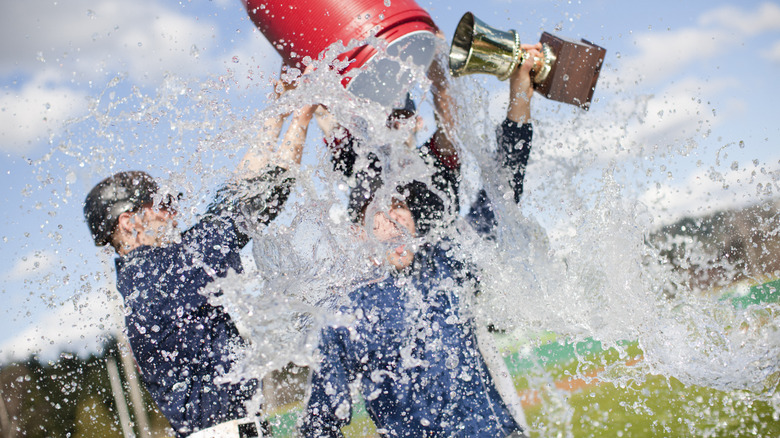The History Of How Gatorade Got Its Name
At this point in time, store shelves are stocked to the brim with energy and sports drinks. Each one is more extreme than the last and slashed with supercharged labels full of lightning bolts, boldly angular lettering, and poppingly explosive names that we're all too familiar with: Rock Star, Red Bull, Monster, etc. It's as though each drink is trying to complete for attention by punching you in the face with pump-and-amp-you-up gym-and-field rage. And then there's the tame-named Gatorade: favored clerical assistant to Everglades 'gators since 1965. Oh, and also the candy-hued, ice-cold, sticky juice dumped on coaches ever since the Chicago Bears's Mike Ditka got soaked in 1984, as Twitter shows. But where did Gatorade get such a weird name?
Statista tells us that Gatorade is one of the highest-selling sports drinks in the world, with 4.31 billion cases — not bottles — sold worldwide in 2021 and 1.92 billion of those cases sold in the U.S. alone. At this point, there's Gatorade Perform, Gatorade Frost, Powerade, etc., with some truly appalling flavors that sound best suited to rotting children's teeth, like Frost Glacier Cherry, Riptide Rush, and Fierce Melon. All of them contain "Gatorade Thirst Quencher Level Electrolyte," whatever that means. But long ago, back before such product convolutions and dazzling names, Gatorade was a simpler drink. And believe it or not, as our earlier joke alluded, it was named after the Florida Gators college football team.
Gatorade: the aid sweaty Florida Gators need
Gatorade was created in the least likely place that you'd expect to find it drunk: a science lab. Dr. Robert Cade (which rhymes with Gatorade) created it in 1965 at the University of Florida, College of Medicine, in Gainesville. He set to work on a concoction meant to encourage sweating because Florida is hot, and the Florida Gators' football players were dying of heat. Players were basically sweating and urinating their energy away, and Dr. Cade wanted to replace their lost water not only with more water but also salt water. He was head of the University of Florida's renal and electrolyte division, which gives us a clue about his solution: the ubiquitous and mysterious substance we see everywhere in modern energy and sports drinks, electrolytes.
Dr. Cade went to the Gators' coach, Ray Graves, who let him do a little experiment on players. Graves didn't understand the science too well but went along with it anyway. Cade realized he needed a drink with sugar as well as salt to give players a quick energy boost in addition to promoting sweating. Electrolytes themselves are chemicals with positive or negative charges that help conduct electricity throughout the body. This helps regulate the body's fluid and chemical apparatuses, which helps keep players going. And somewhere along the way, Dr. Cade must have thought, "I'm giving aid to the Gators."
The birth of a sporting event staple
Fortune tells us that Dr. Robert Cade's first attempts at producing an electrolyte-infused energy drink "tasted so like seawater that players promptly threw it up." Thanks to a suggestion from his wife, Dr. Cade added lemon juice to the mix to make the drink more palatable, and boom: instant Gatorade. It's likely that October 2, 1965 marks the first game that saw Gatorade in action, when the formerly heat-stricken Florida Gators faced off against Louisiana State University. There's no telling whether or not Gatorade had gotten its name by then, or if Dr. Cade intentionally sought to rhyme his name with his product. But whether by electrolytes, magic, or placebo effect, the Gators won the Orange Bowl in 1967.
That year Dr. Cade sold the rights for his drink to Stokely-Van Camp, a business that specialized in canned pork and beans. And indeed, early Gatorade came in cans. It took until 1973 for Gatorade to adopt its lightning logo, and by the early 1980s, it became a staple at sports event sidelines. We probably have the coach-soaking Gatorade ritual to thank for helping the drink solidify its prominence in the sports drink market amidst a glut of rising competitors. To this day, players of all sports across the world continue to chug Gatorade, up to and including the Kansas City Chief's recent Super Bowl LVII victory that culminated in a purple waterfall sloshing down Andy Reid's jacket.


